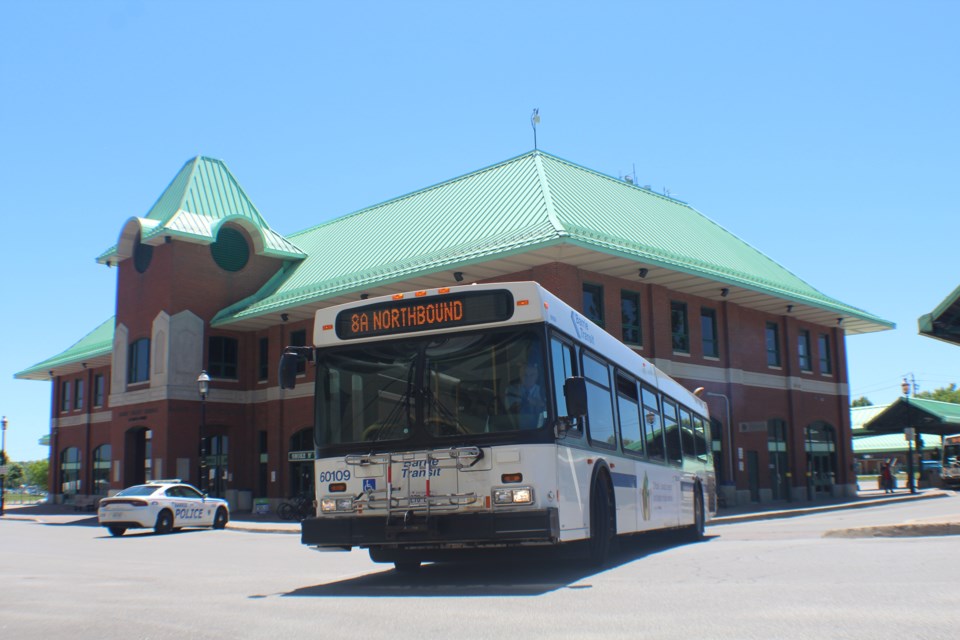Beginning next year, Barrie Transit could be changing lanes to move as many people, to as many destinations, as quickly, frequently and reliably as possible.
The city’s new public transit network was given initial approval Wednesday night by the city’s infrastructure and community investment committee.
“I think there is some incredible work done here on the imagining and the future of transit in Barrie,” Mayor Alex Nuttall said of the plan. “I really do think this is taking the city in the right direction for transit.”
The new network could be rolled out in 2024 and be completely in place the following year. It still requires approval from general committee and city council.
“The proposed network responds to what Barrie residents are looking for,” said Dennis Kar, public transit consultant with Dillon Consulting, who presented the plan to committee.
The new network is to include express service, which would directly connect users between Royal Victoria Regional Health Centre (RVH) and Georgian College, Bayfield Street, Essa Road, and Park Place by a bus route on Highway 400.
Frequency would be improved by giving 70 per cent of existing transit customers access to a 15-minute frequent route in the new transit network for a portion of their trip.
Cross-city transit trip times would be reduced by approximately 13 per cent and Barrie residents would have access to approximately 24 per cent more jobs within a 30-minute transit travel time.
There would be new transit coverage on Benson Drive, Hanmer Street, Lakeside Terrace, Amelia Street, Morrow Road, Caplan Avenue, and King Street.
These service changes have been built to be cost-neutral, in terms of operating hours due to the Transit ON Demand service model, which allows the service to maintain and add coverage efficiently across low-transit demand areas in Barrie, according to staff.
The peak vehicle requirements for the new transit network would see a change in the service vehicle types that would result in more than $10 million in capital cost reductions for growth or replacement vehicles in the city’s 10-year capital plan.
Coun. Bryn Hamilton asked for timelines for moving Barrie Transit into new areas of the city.
Brent Forsyth, Barrie's director of transit and parking strategy, said that would happen during council’s annual budget deliberations.
“That’s when council decides whether it’s added,” he said.
“That is something we will have to discuss,” Hamilton added.
The new transit network is a response to the plans for the Allandale mobility hub and downtown mini-hub. Moving Barrie’s primary terminal operations requires route changes, so city staff took the opportunity to evaluate Barrie Transit’s entire network for potential changes to better meet the needs of today’s and tomorrow’s transit users.
The Allandale transit mobility hub is to provide inter-regional service, seamless transit connections between Simcoe County, Muskoka and the Greater Toronto Area and be integrated with two-way GO train services, located at the Allandale Waterfront GO Station.
The mini-hub would include bus stops and sheltered waiting areas at 24 Maple Ave., which is the current Barrie Transit Terminal. The bus stops would maintain downtown Barrie Transit service and provide direct access routes to and from the core.
The network also responds to Barrie’s updated Official Plan, which has new and revised population projections, intensification corridors and strategic growth areas for transit to service. The new network is to provide enhanced service where growth is planned, before resident travel habits have been established.
Barrie’s transit ridership trends are changing, being influenced by numerous factors such as population growth, urban development, new technologies, environmental factors and changes in commuting patterns. The network responds to these trends by being more efficient, sustainable and accessible, reflecting a growing city, according to staff.
Transit ON Demand service is a morning/evening peak-hour bus that accommodates the actual ridership demand, with a third peak bus available if ridership warrants it. Transit ON Demand is without a fixed schedule or route. Users can book their trip through an application and then bus travel is optimized through a computer-based system. The service operates within a specific zone, allowing riders to travel from bus stop to bus stop within the zone on demand.
Barrie Transit began operating this service as a pilot program in August 2020 and the city says it provided short travel times, good on-time performance and had good reviews from riders.
The 2023 operating budget for Barrie Transit, worth approximately $25.3 million, is funded by $6.3 million from fares and passes, $400,000 from advertising revenue and $3.3 million from Ontario gas tax, with the remaining approximately $15.5 million funded by the general tax levy.



